sixty-four: ultimately it's more rewarding, creating things
This from an Oxford Union interview with Mat Baynton, whom I have adopted as a temporary Taskmaster crush for approximately eight to twelve weeks — but is also quite a serious artist, which is to say he is quite self-aware and studied about the act of playtime. Best kind of person: the type who understands exactly how and when to be silly and how and when to be serious, and is actually capable of both. Tactical play. 💪 I adore it.
This series of Taskmaster has been a thread of pure, unadulterated joy through the whole spring and into summer, especially in the week where the air quality here in Toronto got so bad we topped the bad air quality charts and I basically had to bunker in my apartment, HEPA filter running 24-7. And the three days where it was so hot I had to bunker inside again, not cooking. And the bit where upstairs’s washing machine broke and I woke up to water damage on the ceiling and a decided wet-rock smell and turned that HEPA into a drywall drying fan. You never think a little air filter unit is going to be this much of a multitool, but: $180 well spent.
In the weeks between new episodes, I did the backlist binge, and apparently Horrible Histories is straight-up hilarious, and Yonderland is even better (shades of a slightly sharper Pushing Daisies there), and Ghosts took me a while to get into because it leans a little too much on humour-of-embarrassment for the first bit, but we found our groove ultimately. It’s a great back catalogue, and especially so if you’re in a bit of a mood.
Chatting about this with a local acquaintance spawned an interesting little iteration in my slow-motion chew on parasociality. I’m just as capable of enjoying a recreational actor crush as anyone else; I just want to enjoy it a normal amount? Like, six good weeks of playing around with the surprise and delight of that little public slice of someone, fully understanding this is a slice, this itself is a game, this person knows something I don’t and I want that not them, without making it my whole personality or social life or identity or getting entitled about anything here. And then you get to move on to the next interesting situation.
We were picking at this, looking back (said acquaintance is a major advocate of rec-league crushes) and — right, that’s what the word crush is actually for. When nobody needs to mean anything by it. It makes me wonder when and how that was so thoroughly edged out of frame: more into the world where every passing affection has to be intense or permanent, where every band you like is a fandom, where every extracurricular you try is a career path, where every person you’re glancingly nice to is a friend, where they give you a battery of personality tests in ninth grade and declare your career at 14. (This happened. Teenage me was unimpressed at the time, too.)
A less busy and more interested person would be writing an essay right now on all this and Cory Doctorow’s own essay on the disappearance of slack, and that the crush itself is a — form of social slack. I am a more busy person only intermittently interested, so instead: here you go. The Aristocrats!
down to a funless sea
It does tie into one of the major long thoughts this month: ie where the fun is.
In the first week of June (smoke week), through some ancillary Wikipedia wandering, found Home Movie: The Princess Bride — one of those early-COVID things I entirely missed in a slew of early-COVID things. I meant to watch the first bit, and watched the whole thing, giggling and crying a little all the way through. The Princess Bride is one of my favourite, formative stories. I saw it on a PA Day with my mother at five years old, opening day, and can quote along with it basically from memory, routinely backfilling bits from the book that aren't in the movie when they should’ve been. Most of these actors clearly love it just as much (there are some killer Wallace Shawn impressions going here) and it’s just wall-to-wall glee.
Even though it doesn’t do the job of controlling a disease itself, I — have a great deal of affection for people who, with no idea what to do next, respond to the end of the world with dressed-up corgis and toy lightsabers and Lego (the right answer). Something that just fills my whole chest with delight. And the crying was because I kept thinking: oh god, 2020, when we still remembered how to be fun.
As you can probably tell from the last few issues, fun is rather top of mind right now. I am not having enough after years of it being on backorder, it is arguable that this entire city is experiencing a deficit, most people through wide streams of society don’t seem to be having any, and some of the extant fun has a real air of the obligatory. I did hit up Pride this past weekend — and actually marched in the parade for once, which I usually never do, largely in search of participatory fun. Perhaps it was the heat, but there was a whiff of duty about the entire thing. Multiple booths about intimate partner violence and, well, fewer about joy. Hard not to read a little into that, times being what they are, hard and getting harder all the time.
(Tangent: It is odd and a little hilarious to do the Dyke March the week you’re binging an in-depth podcast about the French Revolution. You find yourself baking in 30 C start-stop parade traffic less at a march and more at a loiter, feeling a bit too much like you’re queuing; wondering what you should storm at the end of this rally, how you’ve formulated your stance on monarchy, and whether your demands are constitutional or more like capping the price of bread. Cue the Kaiser Chiefs. 😀)
But this has been the flavour: the worse and messier things get, the more I want to find the end of the string you can play with. I have no use for certain kinds of seriousness right now; they don’t seem to allow for any through traffic. Like, if being serious and panicky about everything isn’t actually working, time for alternative strategies.
So my fun is well into its rehabilitation programme, but it's also not got a lot of workable habitat at the moment. Suggestions most seriously welcome. The world’s not about to stop upheaving, I think. There is no point in waiting for some point where it stops, and holding our breath.
things heard
One of my projects during the smoke- and stress-enforced downtime (and then the extreme heat- and stress-enforced downtime) was catching up on the huge backlog of podcasts people have sent me, and which I swore up and down I’d actually listen to. Baseball has been paywalled basically into the ground at this point (fuck you very much, Rogers Media), so while I cook and can and playStardewValley and line up a backlog of home repairs, it’s been climate work and future visioning time.
First recommendation: Former Mayor of Toronto David Miller’s Cities 1.5 podcast, which comes out of his current work with C40 Cities. If you’re into climate, cities, and experimenting our way out of crisis by the seat of our wits, this one might be a good fit for you. It’s smart, considered, and hands-on about urban climate.
The second big bite has been From What If To What Next, which can get kind of painful in the mechanics of its early-pandemic coping sometimes: especially in early episodes, I found myself badly missing an era when we took pulling together as a given (see: fun). But it’s also lovely: Every so often, in drips and sparks, I find My Kinda People™, and apparently Rob Hopkins is one of them. Ask questions, tinker with the results, play tactically.
This one actually did tie into this month’s informal summit on having any fun and play: Episode 16, What if We Took Play Seriously? is high-quality listening. It dips into some of the same childhood neurology stuff that I built last summer’s UBC climate talk on, but it’s also deeply about understanding how fun is (“There is value — immeasurable and unparalleled value — in having a good time.” <3). And being willing to do it.
On the other hand: Listening to this, I’m reminded there is a slice of progressive activism that has a really twisted relationship with certain concepts — notably the word comfort. There is a way a particular segment uses that word which has zero relationship to nourishment, relief, safety, care-in-relationship, presence-in-grief, a river in a time of dryness, love when it’s hard, and it makes my skin crawl. I don’t think that should actually be stripped down to people who still have enough material or community safety in their lives that I can’t traumatize them into agreeing with me. It’s fucked up. I’m not in this to be more fucked up about things; the goal has always been less.
Similarly, there’s an occasional surfacing contempt from some guests for the idea of incremental change. I’ve noticed a lot of people who deliberately cast themselves as speaking from a political viewpoint (“as a leftist, I”) throw out the whole of a tool when they’re really just, I think, mad at the ways it’s misapplied or misused. Like mate, just because someone says “I fucked you around because [koala]” it doesn’t mean any actual drop bears were involved in the situation. And frequently, whether we like it or not, the way change works on the ground is always—
(—okay, wait, shit, that’s a poem. Or a praxis. Yes. Okay. Hold please.)
The third has been Revolutions (the aforementioned podcast about the nuts and bolts of same), which was definitely a recommendation but I can’t remember from whom; it’s been on the shelf that long. Just that it came from a dude friend, I think, and we were crossing College northbound at Spadina when it was recommended to me. I’m enjoying it, partly because of the Horrible Histories satire prep, partially because, when it doesn’t get mired in the details of who militaried what to whom, it’s got tinges of that same systemic-thinking approach that Dan Snow’s big history of the Plantagenets had: reaching through the events for the social and emotional dynamics of what happened. History less as events, more as a sort of — atmospheric system? It’s just enough same shit, different century to be both relevant and not send a person up a tree with irritation, because everyone involved is thoroughly dead, which is a sweet spot during geopolitical bullshittery: insight with buffer.
I occasionally take mild crap in Toronto municipal scene space (and it most definitely is and has been a scene) for my more emotive readings of what’s going on: less baseball stats, more about the social and relational dynamics of various councillors, workplaces, systems, and how they flow into and cause each other. What people think a problem is, what people think solutions are, what are their contexts and habits and limits and how that impacts policy here. But I really do think it’s the pattern that holds. People don’t make most decisions quantitatively, and the interface between systems and personalities and how each bends the other a little is — sort of the place where things happen, a lot of the time. Where you get on the river makes a huge difference in where you end up, even if it’s the same river system.
So it’s interesting, having puttered my way through two major revolutions so far — Cromwell/Charles I and about 2/3 of the French Revolution(s), which are so long and so stupid and so illustrative of people trying to do the same thing over and over again to get somewhere that river just don’t go — how much of the escalations come down to conflicting assumptions, shit communicators, lack of mutual or social trust, the short-term and destructive things people do when they’re panicked, and not asking the right questions. Or listening with a certain amount of grace for the answers. Like, it is actually a massive skill to read a room! That’s not a soft social grace; in many situations, it’s everything!
It also has me (again, as usual, been like ten years now) thinking a lot about violence as the long problem of human history: a slow series of generations-long experiments, iterations, fumblings, retrenchments mostly about oh god what do we do with the hitting? And man, we do not have an answer yet. So it’s troubling, seeing people flail through the same mud we’re in centuries ago. It’s also a little encouraging: we legit have more tools in the belt than they did, because they basically died to develop them. The lifetime of an iceberg is millenia; the life cycle of a movement is decades and centuries; time is long, and time is round. It’s worth just keeping up one’s corner.
greens greens greens
—has been the state of affairs all month. Abruptly, and overnight, I hit that pivot between babying the plants so they don’t die and having to plan meals explicitly to keep up with the amount of produce coming in: seemingly infinite lettuce from the farm, regular spinach and arugula from the balcony, bok choy, red napa cabbage, and lacinato kale from the two plants doing surprisingly well (two others? middling. I think they need more nitrogen). The peas started up this past weekend (late). It’s also hot, so I hope they hang on and don’t just do one burst and die. I like peas.
All food is now salad. The act of grocery shopping has largely been find things to put on salads to keep them fun and functional. And interestingly, it’s a lot easier to justify eight bucks for halloumi when the lettuce and spinach and quick-pickled garlic scapes and sorrel I’ll be eating it on all week was, well. Free.
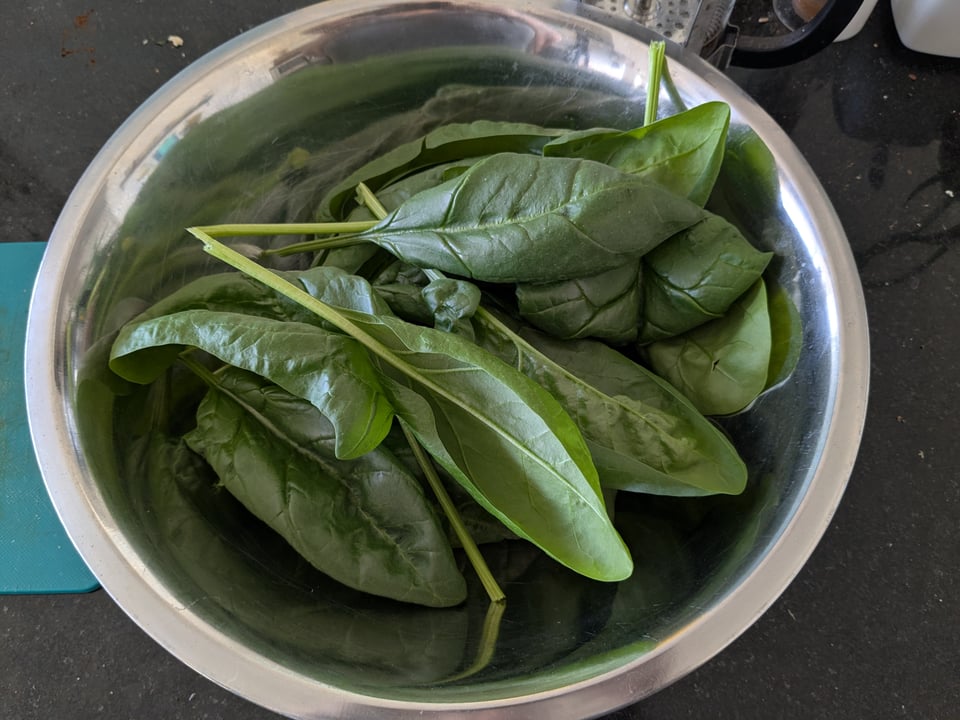
Around Solstice week, the sluggish tomatoes, beans, and cilantro started to look busy, and then we hit the most intense heat wave Toronto’s seen in my lifetime, and I was babying the plants again, just in the other direction. I didn’t lay my hands on mulch in time, but there was a lot of getting up at 5am to water, when it was at least marginally cooler, to try to keep everything alive and lower the chance that it’d just evaporate out of the soil on contact. It’s sort of worked?
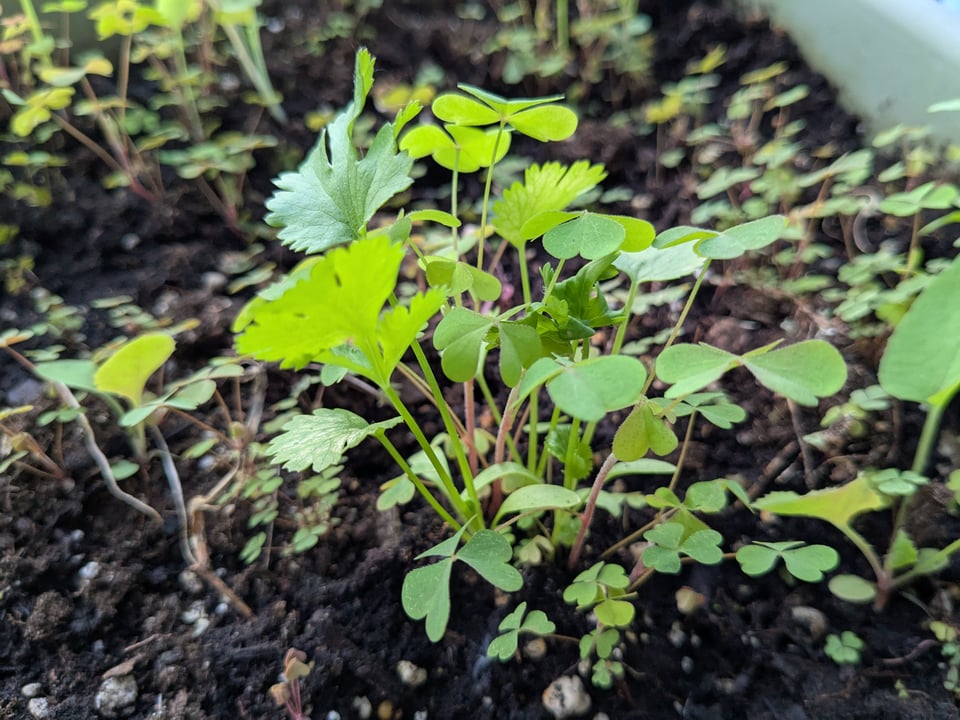
That said, did a few trips to the farmer’s market anyways. Public Markets Week came that same week, and while I didn’t mean to spend money at St. Lawrence, just go to the advocacy panel programming (good, interesting, just not much that generates reportage) — guys, the man had ume plums.
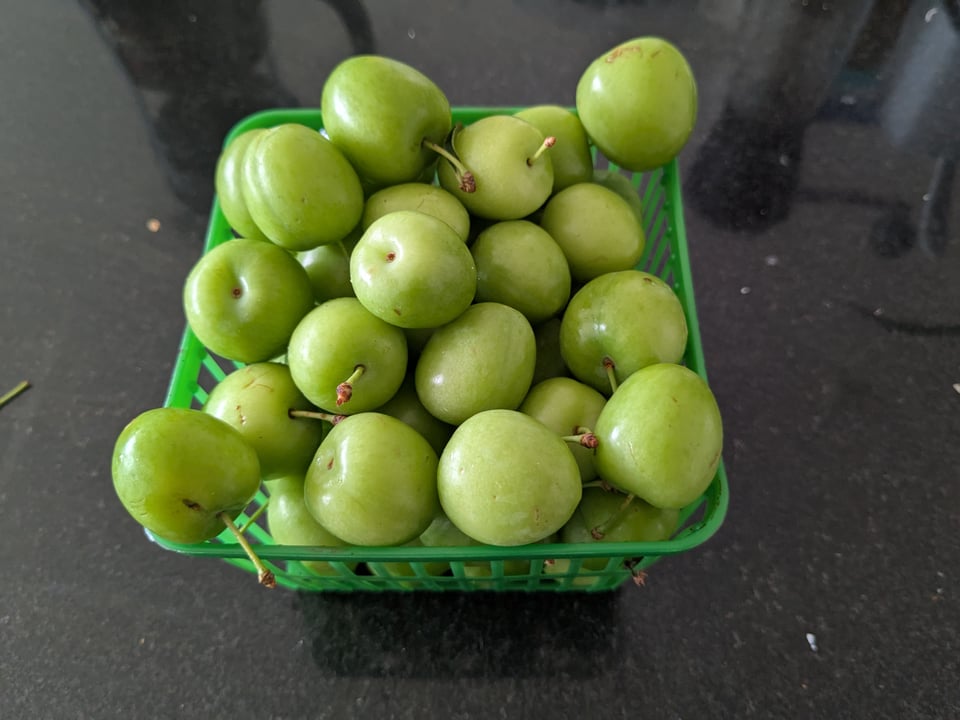
It’s also abruptly canning season — a lot of short, sharp shifts this year for some reason — and fruit picking season. I spent Sunday morning in a backyard off a back alley in my old neighbourhood, pulling this many cherries off a most beautiful tree.
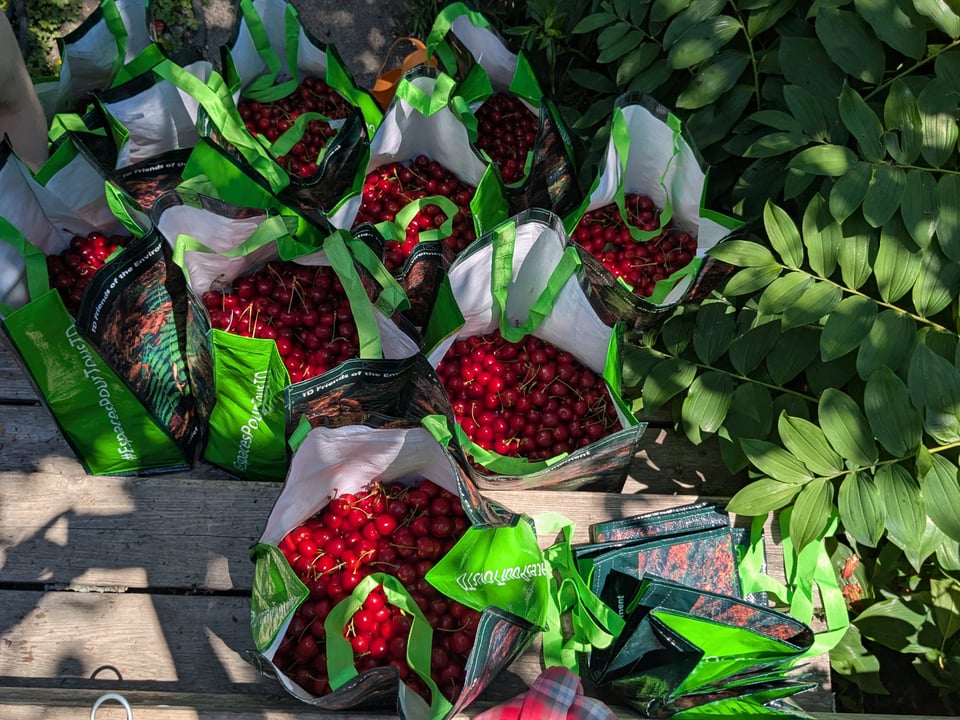
My share there was something approaching 10 lbs, and as ever, there is nothing that makes you feel more badass than strolling home with 10 lbs of free ripe cherries you got with only a few hours’ work. While some of them have already been handled (friends, snacks, a massive cherry clafoutis) the clock is now ticking for jam. This, the farmer’s market rhubarb, the garlic scapes I’ll be picking up from my CSA farmer this afternoon, some of the in-season asparagus — all need to go into jars stat.
It’s a farm night tonight, so I’m having trouble timing this up with the practicable physical limits (scored myself a great sunburn Sunday morning, and my back is still making comment about two hours with a cherry pick pole). But the shelf life of fruit is something I mind a little less, when I find myself racing the clock? There’s not so much lose condition here. Worst case, you give up and just eat it. Second-worst case: Text your friends.
things read
A slower enterprise this month, but I finished off a history of Toronto’s 1800s-era religious streetcar battles: you would be shocked at how much fuss this town can make over Sunday service, unless you already engage with local government, and are quite aware of the volume of fuss; it was actually a really useful contextualization of some governance reflexes. But probably a bit niche otherwise?
And dove into Carolyn Steel’s Sitopia, which was excerpted into my Urban Food Security course last semester in ways which made me want to read the whole thing. I’m halfway through and really enjoying it: a slowly upscaling lens on the place of food in human history and society, from the individual to the community and outward, considering all the stories we put on and derive from food practices very equably.
It also offers up thoughts like this:
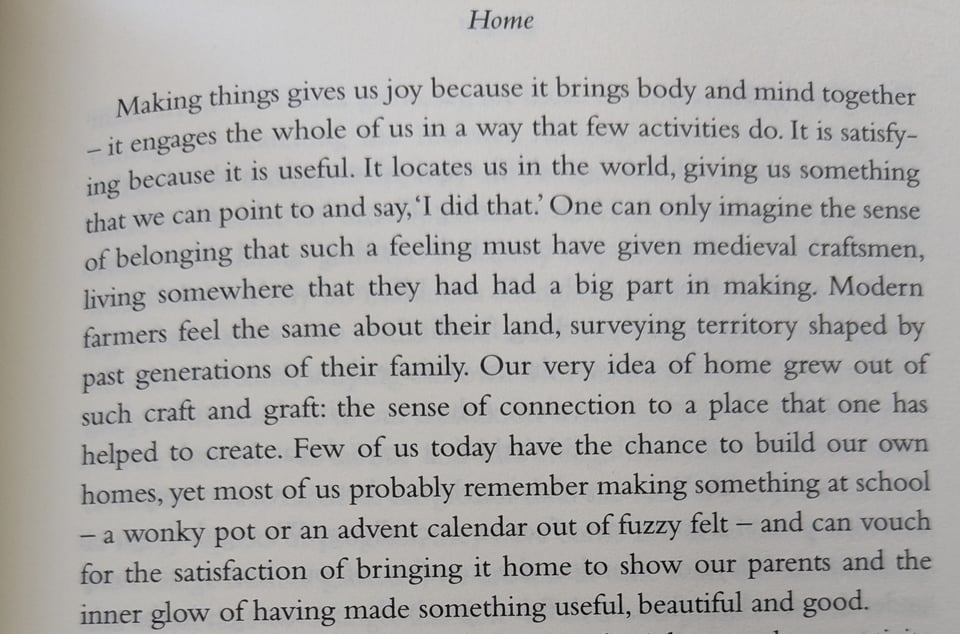
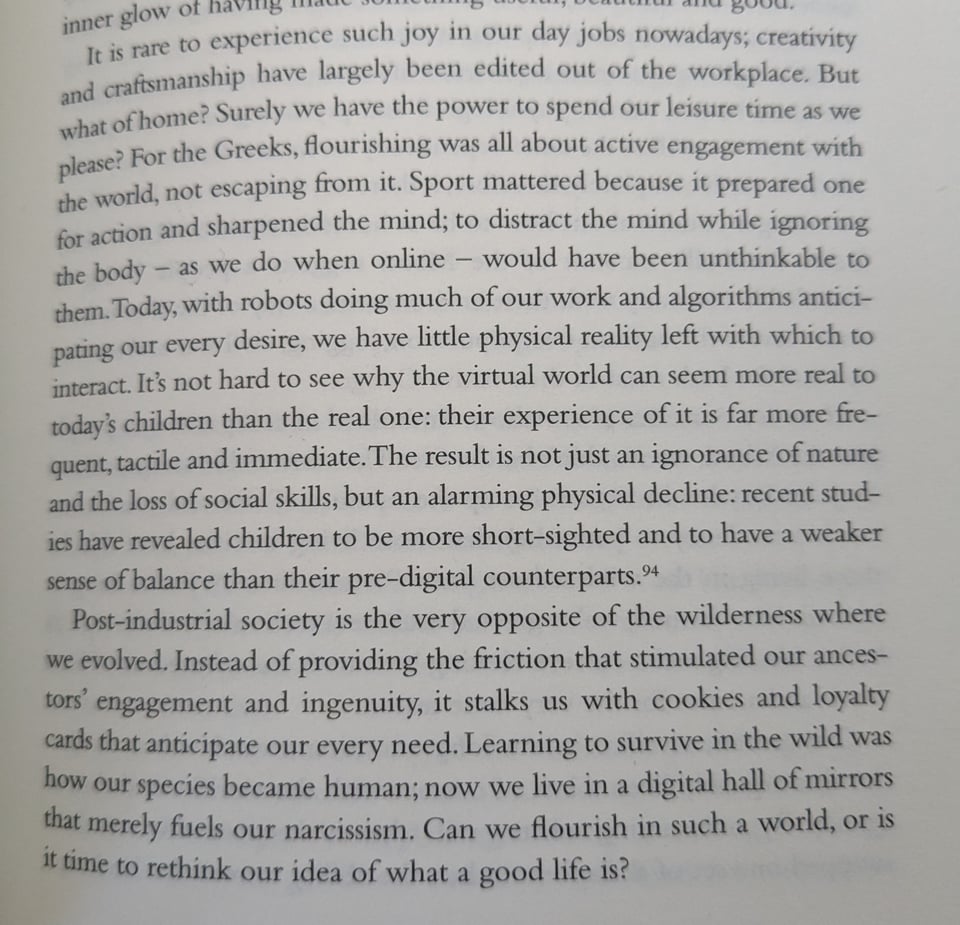
It’s idea-dense reading, so it’s best eaten in courses, but thus far: deeply worthwhile.
things to read
The digital publication of the Reckoning poem about the fishes is due to drop next Monday, I think? So it should be available online through that TOC.
There’s also a review upcoming in the next Spacing, which may be out by the time we hit August? I’ll keep you updated if so.
frequent, tactile, and immediate
On that note: I need to pick up some garlic scapes and drop off a thank-you jar of homemade grape ketchup, see if the Asian grocery is open today to get more pickling vinegar, shuttle everything home before it’s time to head up to the farm to weed and water — early today, because the subway’s on Sunday service for Canada Day and it’ll take a while. Extra sunscreen, extra water bottle.
Happy holiday week(ends); see you in August.